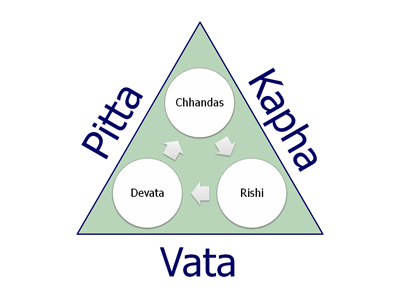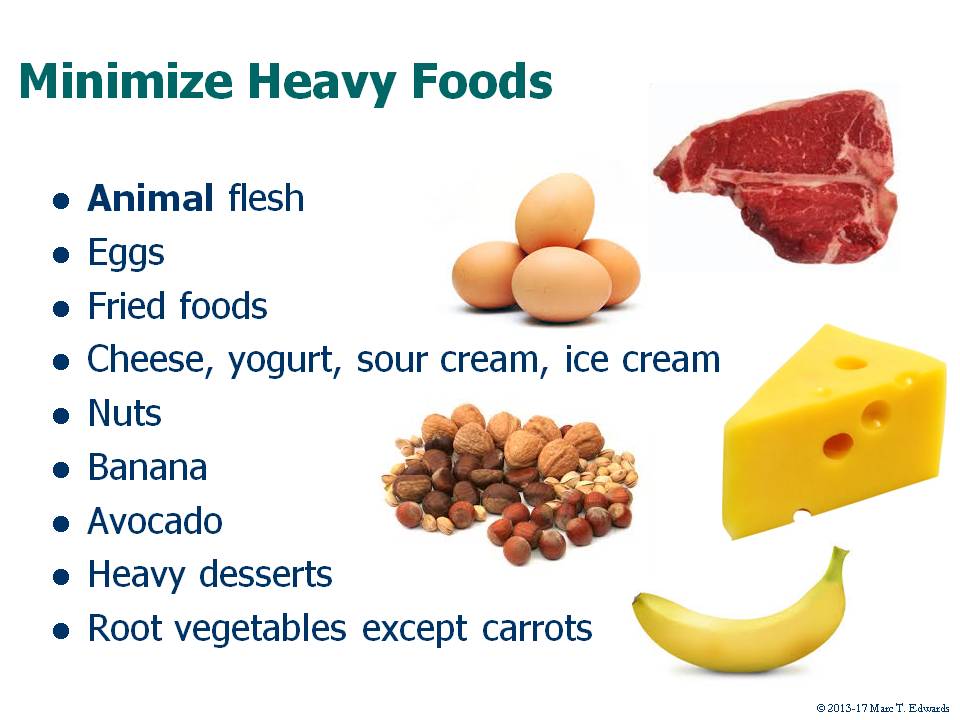Balancing the Doshas
Apply the Principle of Similars and Opposites

If you're looking to achieve and maintain proper balance of your own unique combination of Doshas, you first need to understand the qualities of the three Doshas and how they vary with the cycles of Nature (see Doshas). You also need to have a reasonable idea of your own Prakriti (constitution or essential nature) and Vikriti (imbalances). In general, treatment of digestive disturbances and Ama takes precedence over Dosha balance, even though they are often inter-related. Furthermore, you'll do well to assess your own current habits against the general Ayurvedic guidelines. Good basic health habits are the platform for fine-tuning based on individual differences.
That said, keep in mind the basic concept that like increases like and that balance is achieved by bring opposing qualities to bear. For example, if you are too heavy, you should favor lighter foods in your diet.
In the initial stage of imbalance, our spontaneous desires usually push us in the right direction to restore balance. When imbalance progresses, however, we can crave the things that make us worse.
Any Dosha that gets out of balance can disturb the functions of the other Doshas. Because Kapha is inherently stable, it is uncommon to find it the source of trouble. When Kapha does get out of balance on its own, it will typically present as disturbed digestion and Ama. Vata causes four times as many diseases as Kapha and twice as many as Pitta. I frequently see clients with mixed Vata and Pitta imbalance. Alcohol, caffeine, and late bedtime are common contributory factors. Beyond that, if you have signs of imbalance in more than one Dosha, you'll likely find it helpful to have a consultation to sort out what is primary.
Understand Common Causes of Imbalance
The following table highlights the most common factors that contribute to imbalance.
| Vata | Pitta | Kapha |
|---|---|---|
| Staying awake at night or insufficient sleep | Over-exertion | Sleeping during the day |
| Fear, grief, worry, stress | Excessive talking | Excessive sleep |
| Travel | Hot, spicy, salty and sour food | Lack of exercise |
| Excessive exercise, sex or mental activity | Anger, hatred, jealousy, passion | Lack of mental activity |
| Suppression of natural urges | Fasting | Over-eating |
| Irregular daily routine | Alcohol, tobacco, caffeine | Heavy, oily, cold, sweet, sour and salty food |
| Old age, late fall & winter, injuries, surgery, childbirth | Middle age, summertime, exposure to heat or mid-day sun | Childhood, springtime |
| Excess pungent, bitter and astringent taste; light dry, rough, raw diet; insufficient food; caffeine | Over-work, over-use of eyes especially with computer screens | Cool and damp climates |
Keys to Dosha Balance
Here then are the most important considerations for balancing Vata, Pitta and Kapha.
How to Balance Vata
Vata represents movement. When out of balance, Vata causes problems in mind and body related to irregular movement such as variable appetite, constipation, insomnia, poor circulation, etc. Many individuals with a Vata-influenced constitution love variety, but they need the framework of a regular routine to remain stable and grounded while pursuing and enjoying that variety.
- Get to bed before 10 PM
- Maintain a regular daily routine (see Ideal Daily Routine)
- Follow a Vata-pacifying diet
- Favor warm beverages
- Food should be warm, freshly prepared and unctuous
- Use liberal amounts of sesame oil. Ghee, butter, olive oil and coconut oil are also good.
- Avoid alcohol, caffeinated beverages, and chocolate
- Avoid raw or gas-forming vegetables (broccoli, cauliflower, cabbage, kale, etc.)
- Have some boiled milk with cardamom before bed with 1-4 tablets of Organic Triphala Rose
- Practice Transcendental Mediation
Other Beneficial Practices
- Pranayama breathing practice
- Exercise in moderation and not to the point of exhaustion: walking in nature and yoga are good choices
- Abhyanga self-massage with organic cured sesame oil (see Ideal Daily Routine)
- Nasya with cured sesame oil or Organic Clear & Soothe Nasal Spray from MAPI Products
- If you tend to feel anxious or worried, take Worry Free 1-2 tablets twice a day, about 8 AM and 4 PM with warm water
How to Balance Pitta
Pitta represents metabolism and transformation. When out of balance, Pitta causes problems related to excessive heat and acidity in mind and body such as acid indigestion, anger, fever and rashes. Those with a Pitta-influenced constitution tend to be industrious, ambitious, impatient, critical, and competitive. In seeking to transform their environment, they tend to over-do it. Thus, Pitta often needs moderation.
- Cultivate moderation in all things and don't take yourself too seriously
- Get to bed before 10 PM
- Be careful not to over-work or strain the eyes with computer or TV especially in the evening (get f.lux software)
- If you are easily irritated by all the "idiots" that surround you, take 1-2 tablets of Stress Free Emotions after lunch and dinner
- Take time for play, particularly with children
- Enjoy exercise, but avoid getting over-heated or too embroiled in competitive sports. Swimming, skiing, walking in nature by bodies of water, cycling, yoga, etc. are good choices
- Protect yourself from the mid-day sun
- Follow a Pitta-pacifying diet
- Take time to eat a hearty lunch
- Favor room temperature, but not ice-cold, beverages
- Food should be freshly prepared and moderately unctuous
- Favor ghee in the cooking along with cooling spices like fennel, coriander, cardamom and turmeric. Coconut oil and olive oil are also good.
- Avoid chili peppers, vinegar, salt, alcohol, tobacco, caffeinated beverages and chocolate
- Before bed, have some milk boiled with a little ghee, saffron, cardamom and sugar, once cooled to a comfortable temperature
- First thing in the morning after brushing the teeth and rinsing the mouth, drink some pure water left overnight in a cup of pure copper
- Practice Transcendental Mediation
Other Beneficial Practices
- Pranayama breathing practice
- Abhyanga self-massage with coconut oil on the head and cured sesame oil on the body. Alternatively, just use olive oil (see Ideal Daily Routine)
- Nasya with ghee or cured sesame oil
How to Balance Kapha
Kapha represents structure. By nature, Kapha is stable, slow and resistant to change. That is both a blessing and a curse. When out of balance, Kapha causes problems in mind and body related to accumulation and stagnation, such as obesity, slow digestion, respiratory congestion, lethargy and depression. Kapha needs mental stimulation and physical activity to stay in balance.
- Get up and get active: take a brisk walk soon after sunrise, preferably in a beautiful, natural setting
- If you have a sedentary job, walk briskly at least 10 minutes every few hours or get a standup desk, perhaps with a treadmill
- Awaken by 6 AM without an alarm
- Exercise regularly and vigorously
- Seek out challenge for your intellect
- Minimize heavy foods
- Take 1 tsp. raw honey in a half cup of warm water to start your day
- Favor warm beverages
- Food should be warm, freshly prepared and not too unctuous
- Enjoy spices, especially fresh ginger
- Avoid alcohol, caffeinated beverages, chocolate and other sweets
- Don't eat breakfast if you aren't really hungry
- Have a light dinner, preferably before 7 PM
- Start a habit of taking a liquid fast one day a week
- Practice Transcendental Meditation

Other Beneficial Practices
- Pranayama breathing practice
- Abhyanga self-massage without oil using raw silk or wool gloves (see Ideal Daily Routine)
- Nasya with cured sesame oil or Organic Clear & Soothe Nasal Spray from MAPI Products
Summary
The following table summarizes the keys to achieving balance by Dosha as discussed above.
| Vata | Pitta | Kapha |
|---|---|---|
| Go to bed before 10 PM | Moderation | Vigorous exercise |
| Regular daily routine | Rest the eyes in evening | Walking |
| Main meal at noon | Main meal at noon | Main meal at noon |
| Yoga, pranayama, meditation | Walk by water, swim, snow ski | Awaken before 6 AM |
| Abhyanga | Avoid mid-day sun | Liquid fast once a week |
| Hearty, warm, unctuous, sweet, sour & salty food, sesame oil | Sweet, bitter & astringent food, ghee, dilute lassi | Light, warm, pungent, bitter & astringent food, honey |
Resources
- Food and Health
- The Doshas
- The Three Gunas
- Vedic Science
- The Dhatus
- Ideal Daily Routine
- Managing Personal Change
- Balancing the Doshas
- Managing Indigestion
- Ama Reduction
- Home Detoxification
- Rasayanas - Elixirs for Health
- New Client Questionnaire
- Health Habits Assessment
- Dosha Assessment
- Digestion Assessment
- Dosha Imbalance Assessment
- Ama Assessment
Sources for Ayurvedic Herbs
| Prakriti | Kapha | Pitta | Vata |
|---|---|---|---|
| Vata | V | V | V |
| Pitta | P | P | B |
| Kapha | K | K | B |
| Vata-Pitta | V | P | V |
| Vata-Kapha | K | V | V |
| Pitta-Kapha | K | P | B |
| Tridosha | K | P | V |
V = Vata Pacifying Diet
P = Pitta Pacifying Diet
K = Kapha Pacifying Diet
B = Balanced Diet